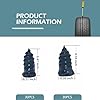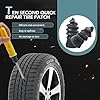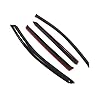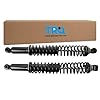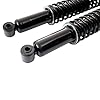Table of Contents
Are you ready for the summer heat, or is your vehicle?
Choosing the right engine oil is key, before summer arrives. The correct oil specifications keep your car running smoothly. They also prevent breakdowns and malfunctions.
If you own a Subaru Forester, knowing your car’s oil needs is crucial. Skipping maintenance can harm your engine.
Key Takeaways
- Understand the importance of using the correct oil for your 2014 Subaru Forester.
- Learn about the benefits of proper maintenance for your vehicle.
- Discover the potential consequences of neglecting oil type and maintenance.
- Find out the recommended oil specifications for your Subaru Forester.
- Get insights into how to improve your car’s health and longevity.
Understanding Your 2014 Subaru Forester’s Engine
The 2014 Subaru Forester has several engine options. Each engine has its own features. Knowing these differences is key to keeping your car in top shape, like choosing the right oil.
2.5L vs. 2.0L Turbo Engine Differences
The 2014 Subaru Forester has two main engines: the 2.5L naturally aspirated engine and the 2.0L turbocharged engine. The 2.5L engine is reliable and fuel-efficient. On the other hand, the 2.0L turbo engine gives more power, perfect for those who need extra speed. The engine you choose affects your driving experience and the oil your Forester needs.
“Subaru says the 2.0L turbo engine needs full synthetic oil,” an expert notes. This shows why picking the right oil is so important for your engine.
Boxer Engine Design and Oil Requirements
Subaru’s Boxer engine design is special. It has horizontally opposed cylinders that lower the car’s center of gravity. This design changes how oil flows and needs specific oil qualities. The Boxer engine’s layout means oil must lubricate all parts well.
How Driving Conditions Affect Oil Needs
Driving conditions greatly influence your 2014 Subaru Forester’s oil needs. Extreme temperatures, whether hot or cold, change oil viscosity and performance. For example, cold climates need oil that stays fluid, while hot climates need oil that keeps lubricating well.
Driving habits, like city driving or towing, also affect oil needs. Always check your owner’s manual or talk to a Subaru dealership to find the best oil for your driving style.
2014 Subaru Forester Oil Type Guide and What to Know
Spring is here, and road trips are just around the corner. It’s crucial for 2014 Subaru Forester owners to know the right oil type. With warmer weather coming, now’s the time to check your car’s oil needs. This ensures your vehicle runs well and lasts longer.
Factory Recommended Oil Types
Subaru suggests using 0W-20 synthetic oil for the 2014 Forester. This oil works great in all temperatures. It’s key to keep your engine healthy and your car running smoothly.
Understanding Oil Specifications for Your Forester
The 2014 Subaru Forester needs oil that meets ILSAC GF-5 or API SN standards. These standards ensure the oil lubricates well, protects against wear, and saves fuel. Choosing the right oil is vital for your car’s performance and warranty.
Decoding Subaru Oil Requirements
Subaru’s oil needs can be understood by looking at viscosity and standards. For the 2014 Forester, the recommended viscosity is 0W-20. The “0W” is for cold weather, and “20” is for warmer temperatures. Here’s a quick summary of your 2014 Subaru Forester’s oil needs:
| Oil Specification | Recommended Value |
|---|---|
| Viscosity | 0W-20 |
| Specification Standard | ILSAC GF-5 or API SN |
| Oil Type | Synthetic |
By following these guidelines, 2014 Subaru Forester owners can keep their car in top shape. This ensures it runs efficiently, saves fuel, and stays healthy.
Decoding Oil Viscosity for the 2014 Forester
Understanding oil viscosity is key for the 2014 Subaru Forester’s engine. It tells us how thick or thin the oil is. This affects how well it lubricates the engine’s parts.
What 0W-20 and 5W-30 Mean for Your Engine
The numbers and letters in oil viscosity ratings, like 0W-20 or 5W-30, are important. They tell us how the oil performs in different temperatures. The “W” means winter, showing how the oil works in cold.
The number before “W” shows how well the oil flows in cold. Lower numbers mean better cold-weather performance.
0W-20 vs. 5W-30: 0W-20 oil is thinner, making it great for cold starts. 5W-30 is a bit thicker and better for high temperatures.
- 0W-20: Better cold-weather starting, possibly better fuel economy.
- 5W-30: Offers better high-temperature protection, good for towing or extreme driving.
Seasonal Considerations for Oil Viscosity
Seasonal changes affect your Subaru Forester’s oil needs. In cold weather, thinner oil like 0W-20 helps start the engine better and reduces wear. In warm weather, thicker oil like 5W-30 protects the engine more.
Climate-Specific Recommendations
Your local climate is key in choosing the right oil viscosity for your 2014 Subaru Forester. For example:
| Climate | Recommended Viscosity |
|---|---|
| Cold climates | 0W-20 |
| Temperate climates | 0W-20 or 5W-30 |
| Hot climates | 5W-30 |
Check your owner’s manual or talk to a Subaru dealership for advice. They can help based on your driving and climate.
Synthetic vs. Conventional Oil for Your 2014 Subaru Forester
Choosing the right oil for your 2014 Subaru Forester is key. Knowing the difference between synthetic and conventional oil is important. The right oil can make a big difference in your engine’s performance and life.
Benefits of Synthetic Oil in Boxer Engines
Synthetic oil is great for Boxer engines, like those in the 2014 Subaru Forester. Improved lubrication is a big plus, as it stays thick in extreme temperatures. This means better engine protection when it’s cold or you’re driving fast. Plus, it helps your engine last longer by protecting it from wear.
- Enhanced fuel efficiency
- Improved engine cleanliness
- Better performance in extreme temperatures
When Conventional Oil Might Be Appropriate
Conventional oil is a good choice for some drivers. If you drive your 2014 Subaru Forester under normal conditions, conventional oil is cheaper. It’s also a good option if you’re watching your budget.
Semi-Synthetic Options: The Middle Ground
If you want something in between, semi-synthetic oil is a good pick. It’s a mix of conventional and synthetic oil. It offers better performance than conventional oil but is cheaper than full synthetic oil.
Cost-Benefit Analysis of Different Oil Types
When choosing oil, think about the cost and benefits. Synthetic oil is pricier but lasts longer and might save you money in the long run. Conventional oil is cheaper but needs to be changed more often.
| Oil Type | Initial Cost | Long-Term Benefits |
|---|---|---|
| Synthetic Oil | Higher | Better engine protection, longer drain intervals |
| Conventional Oil | Lower | Cost-effective for normal driving conditions |
| Semi-Synthetic Oil | Moderate | Balances cost and performance |
The right oil for your 2014 Subaru Forester depends on your driving, budget, and what you value most. It’s about finding the best balance for your needs.
Oil Capacity and Specifications for the 2014 Forester
Knowing the right oil amount for your 2014 Subaru Forester is key to its long life. The oil amount is vital for your engine’s health and performance.
Exact Oil Capacity Measurements
The 2014 Subaru Forester’s oil needs vary by engine type. The 2.5L engine needs about 4.2 quarts (4.0 liters) of oil. The 2.0L Turbo engine requires around 4.8 quarts (4.5 liters).
| Engine Type | Oil Capacity (Quarts) | Oil Capacity (Liters) |
|---|---|---|
| 2.5L | 4.2 | 4.0 |
| 2.0L Turbo | 4.8 | 4.5 |
Accounting for Filter Changes
Remember to replace the oil filter when you change the oil. The oil filter holds about 0.2-0.5 quarts of oil. This extra oil should be factored in when checking oil levels post-change.
Tip: Always check your owner’s manual for the most accurate oil capacity and filter change info for your vehicle.
Differences Between Engine Models
The 2014 Subaru Forester has two engine models: 2.5L and 2.0L Turbo. Each engine has its own oil needs. Knowing these differences is important for your vehicle’s performance and longevity.
Knowing your 2014 Subaru Forester’s oil capacity and specs ensures it runs well. Regular oil changes and maintenance are crucial for your vehicle’s long life.
Recommended Oil Brands for the 2014 Subaru Forester
The 2014 Subaru Forester needs the right oil for best engine performance. The right oil brand is key for your car’s efficiency, longevity, and performance.
Subaru OEM Oil Options
Subaru suggests using genuine Subaru OEM oil for top performance and protection. Subaru’s OEM oil is made for their Boxer engines. It keeps your Forester running smoothly and efficiently.
Aftermarket Brands That Meet Subaru Standards
While Subaru OEM oil is top choice, some aftermarket brands also meet Subaru’s standards. Castrol, Mobil 1, and Valvoline offer quality oils for the 2014 Subaru Forester. Make sure the aftermarket oil meets or exceeds Subaru’s specs.
Budget-Friendly Alternatives
If you’re on a tight budget, there are affordable oil options that meet Subaru’s standards. AmazonBasics and Frantz offer good quality at a lower cost. Always check that the budget-friendly oil is right for your Forester’s engine.
Specialty Oils for High-Performance Needs
For those who drive their 2014 Subaru Forester hard, specialty oils can help. High-performance oils from Mobil 1 and Castrol Edge offer better lubrication under tough conditions. They might improve your car’s performance and engine life.
When picking an oil brand for your 2014 Subaru Forester, think about your driving, climate, and car’s needs. Always check your owner’s manual or talk to a mechanic if you’re not sure about the best oil for your Forester.
Oil Change Intervals for Your 2014 Forester
Knowing when to change your 2014 Subaru Forester’s oil is key to keeping it running well. Regular oil changes prevent engine wear and keep it clean. This is important for your car’s performance and life.
Factory Recommended Intervals
Subaru says to change your 2014 Forester’s oil every 6,000 miles or six months. This is for normal driving. It keeps the engine well-lubricated and clean.
Adjusting Intervals Based on Driving Conditions
Driving conditions can change how often you need to change your oil. Extreme temperatures, towing, or city driving can mean more frequent oil changes. Subaru advises changing oil every 3,000 to 5,000 miles in these cases.
Signs Your Forester Needs an Oil Change
There are signs your 2014 Subaru Forester might need an oil change. Look for:
- Dark or dirty oil
- Increased engine noise
- Decreased fuel efficiency
- The oil level is below the minimum mark on the dipstick
Tracking Oil Change History
It’s important to keep track of your oil change history. This helps you stay on schedule and is useful when selling your car. Use a maintenance log or digital service record to track oil changes.
| Driving Conditions | Recommended Oil Change Interval |
|---|---|
| Normal | Every 6,000 miles or 6 months |
| Severe | Every 3,000 to 5,000 miles |
DIY Oil Change Guide for the 2014 Subaru Forester
Changing your 2014 Subaru Forester’s oil is easy and can be done at home. It’s important for keeping your engine healthy and your car running well for a long time.
Tools and Materials Needed
Before you start, make sure you have the right tools and materials. You’ll need:
- Oil drain pan: To catch the old oil as it drains out.
- Socket wrench or ratchet: For loosening the oil drain bolt.
- New oil filter: Compatible with your 2014 Subaru Forester’s engine.
- Oil filler cap: To seal the oil reservoir after refilling.
- New oil: The correct type and amount for your vehicle (refer to Section 3 for the recommended oil type).
- Funnel: To pour in the new oil without spilling.
- Rags: For cleaning any spills.
Step-by-Step Oil Change Procedure
Here’s how to change your 2014 Subaru Forester’s oil:
- Warm up your engine: Drive your Forester for a few minutes to warm up the engine. This helps the oil drain more easily.
- Find a safe place to drain the oil: Choose a level surface and make sure the area is clear of any flammable materials.
- Locate the oil drain bolt: Underneath your Forester, you’ll find the oil pan. The oil drain bolt is typically located at the bottom of the oil pan, near the front of the car.
- Drain the oil: Use a socket wrench to loosen the oil drain bolt, then let the oil drain into the oil drain pan.
- Replace the oil drain bolt: Once the oil has stopped dripping, replace the bolt and tighten it to the specified torque.
- Remove and replace the oil filter: Locate the oil filter and remove it by hand or with a filter wrench. Dispose of it properly and install a new oil filter.
- Refill the oil: Use a funnel to pour in the new oil. Refer to your owner’s manual or Section 6 for the correct oil capacity.
- Check for leaks: Start the engine and let it run for a few minutes. Check underneath the car for any signs of leaks.
Accessing the Oil Filter
The oil filter in your 2014 Subaru Forester is usually on top of the engine or on the side. You might need to remove some parts or use a filter wrench. Check your owner’s manual or a repair manual for more details.
Proper Disposal of Used Oil
Dispose of the used oil and filter the right way. Take the used oil to a recycling center or an auto parts store that accepts used oil. Don’t throw it away in the trash or down the drain.
By following this DIY oil change guide, you can keep your 2014 Subaru Forester’s engine well-maintained and running smoothly.
Choosing the Right Oil Filter for Your 2014 Forester
Choosing the right oil filter for your 2014 Subaru Forester is key to keeping your engine in top shape. The oil filter is crucial for cleaning the engine oil of dirt and debris. This keeps your engine running smoothly and well-lubricated.
OEM vs. Aftermarket Filter Options
You have two main choices for oil filters for your 2014 Subaru Forester: OEM and aftermarket filters. OEM filters are made by the same company that made your car’s original filter. They fit your Forester’s engine perfectly.
Aftermarket filters come from other companies. They might be cheaper, but their quality can be hit-or-miss. Some aftermarket filters might not be as good as OEM filters, which could harm your engine’s performance and lifespan.
Filter Specifications and Compatibility
It’s important to check the oil filter specifications for your 2014 Subaru Forester. The right filter must match the specs in your owner’s manual or on the manufacturer’s website. Look at the filter’s thread size, gasket size, and flow rate.
- Thread size: Make sure the filter fits well on the engine’s oil filter mount.
- Gasket size: The gasket must be the right size to avoid leaks.
- Flow rate: The filter should let enough oil flow to the engine.
Top Recommended Oil Filters
Here are some top oil filters for the 2014 Subaru Forester:
- Subaru OEM Oil Filter: Made just for Subaru engines.
- Purolator Boss Oil Filter: Known for its top-notch filtration.
- Wix Oil Filter: Offers reliable and durable performance.
Extended Life Filters: Worth the Investment?
Extended life oil filters can last up to 15,000 miles or more. They cost more, but they offer convenience and better engine protection. But, make sure they fit your 2014 Subaru Forester and meet the manufacturer’s standards.
How Engine Oil Affects Your Forester’s Performance
The engine oil in your 2014 Subaru Forester is key to its performance. It lubricates parts, prevents engine failure, and keeps the engine healthy. We’ll look at how engine oil impacts your Forester’s performance.
Impact on Fuel Economy
The type and quality of engine oil in your 2014 Subaru Forester matter a lot for fuel economy. Using the correct viscosity oil can boost fuel efficiency by reducing engine friction. A study by the American Automobile Association (AAA) shows using the right oil can improve fuel economy by up to 2%.
This is because oils like 0W-20 offer less resistance in the engine, which is good for cold starts.
“The right engine oil can improve fuel efficiency, reduce emissions, and prolong engine life.” –
Effects on Engine Longevity
Engine oil is crucial for your Forester’s engine longevity. It lubricates parts, prevents corrosion, and cools the engine. Regular oil changes are key to keeping the engine running long. A study by Consumer Reports shows regular oil changes lead to longer engine life.
| Maintenance Activity | Impact on Engine Longevity |
|---|---|
| Regular Oil Changes | Significantly extends engine life |
| Using Correct Oil Viscosity | Reduces engine wear and tear |
| Monitoring Oil Levels | Prevents engine damage from low oil levels |
Performance Considerations
The performance of your 2014 Subaru Forester is also influenced by the engine oil’s ability to maintain its viscosity under various operating conditions. Synthetic oils are known for their superior performance in extreme temperatures. They provide better lubrication during cold starts and maintain viscosity in high temperatures.
Cold Weather Starting and Oil Performance
In cold weather, engine oil can become thicker, making it harder for the engine to turn over. This can lead to decreased performance and potentially cause damage to the engine. Using the correct oil viscosity for cold weather is crucial. For most Subaru Foresters, 0W-20 is recommended for its balance between cold-weather performance and fuel efficiency.
By understanding how engine oil affects your Forester’s performance, you can make informed decisions about oil changes, viscosity, and overall maintenance. This will help keep your vehicle running smoothly.
Common Oil-Related Issues in the 2014 Subaru Forester
The 2014 Subaru Forester is a sturdy car, but it can still face oil problems. Over time, oil gets dirty and stops working well. This can cause many issues that need attention from both owners and mechanics.
Oil Consumption Concerns
One big problem for 2014 Subaru Forester owners is too much oil use. This can happen because of worn-out piston rings or other engine parts. Checking oil levels often and watching how much oil is used can spot problems early.
| Causes | Symptoms | Actions |
|---|---|---|
| Worn piston rings | Excessive oil consumption, blue smoke from exhaust | Inspect engine, consider repair or replacement |
| Valve stem seal wear | Oil leakage, increased oil consumption | Replace valve stem seals |
| PCV system issues | Clogged PCV valve, increased pressure | Clean or replace PCV valve |
Leaks and Their Causes
Oil leaks are common in the 2014 Subaru Forester. These leaks can come from the oil filter, drain plug, or valve cover gasket. Finding where the leak is coming from is key to fixing it.
Common areas for oil leaks include:
- Oil filter mounting area
- Drain plug
- Valve cover gasket
- Oil pan gasket
Troubleshooting Oil Pressure Problems
Low oil pressure is a big worry for 2014 Subaru Forester owners. It can be due to low oil, a bad oil pressure sensor, or engine wear. To solve it, check the oil, look at the oil pressure sensor, and maybe do an engine check.
Addressing Oil Burning in Boxer Engines
The Boxer engine in the 2014 Subaru Forester can sometimes burn too much oil. This is often because of worn parts or not keeping up with maintenance. Regular oil changes and checks can help avoid this problem.
Knowing about these oil issues helps 2014 Subaru Forester owners keep their car in good shape and running well.
Maintaining Proper Oil Levels Between Changes
Keeping the right oil level in your 2014 Subaru Forester is key for its performance and life. It’s important to check your oil levels often. This helps keep your vehicle in top shape. You need to know how to check oil, add oil safely, watch for oil use, and spot oil problems.
How to Check Oil Correctly
To check the oil in your 2014 Subaru Forester, park on a level surface. Turn off the engine and wait a few minutes. This lets the oil settle back into the pan for an accurate reading.
Find the oil dipstick, pull it out, and clean it with a cloth or paper towel. Put the dipstick back in and pull it out again. The dipstick will show the oil level. Make sure it’s between the marks on the dipstick. If it’s low, you need to add oil.
Topping Off Oil Safely
When adding oil, use the right type for your 2014 Subaru Forester. Check your owner’s manual or the oil filler cap for the correct oil. Pour in oil slowly, checking the level often to avoid too much oil.
Too much oil can harm your engine. Once the level is right, replace the oil filler cap. Start the engine, let it run for a bit, then turn it off. Check the oil level again to make sure it’s correct.
Monitoring Oil Consumption
It’s important to watch your 2014 Subaru Forester’s oil use. Keep track of how much oil you add between changes. If you’re adding a lot of oil, it might mean a leak or your engine is burning oil.
Regular oil checks can help spot these problems early. This way, you can fix them before they get worse.
Warning Signs of Oil Issues
Watch out for signs that your 2014 Subaru Forester might have oil problems. These include oil levels dropping fast, oil leaks, or the oil light coming on. Also, if your engine sounds odd or runs poorly, it could be oil-related.
Fixing these issues quickly can prevent serious engine damage. By following these tips and keeping an eye on your oil, your 2014 Subaru Forester will run well and last longer.
Warranty and Dealer Considerations
Decisions about oil and service for your 2014 Subaru Forester are key to your warranty. Regular maintenance, like oil changes, keeps your car in top shape. It also keeps your warranty valid. A thorough check-up from experts means you can relax, knowing everything is okay.
How Oil Choice Affects Warranty Coverage
The oil you pick for your 2014 Subaru Forester matters for your warranty. You must use oil that meets Subaru’s standards. Wrong oil can damage your engine and void your warranty.
Subaru suggests their OEM oil or something similar. It’s made to protect your engine well. Always check the oil’s specs and certifications to match Subaru’s needs.
Dealer vs. Independent Service Records
Keeping detailed service records is crucial, whether you go to a dealership or an independent mechanic. Good records show you’ve followed the recommended maintenance. This is key for keeping your warranty valid.
Dealership records are easy to keep. But, independent mechanic records are also acceptable. Make sure your records have the date, mileage, and details of the work done.
Documenting Your Oil Maintenance
Keeping records of your oil maintenance is vital for your warranty. Save receipts and logs of all oil changes. Include the oil type and mileage at each change. These records are crucial for warranty claims.
Logging your oil change history is also smart. It helps you remember when to change the oil next. It also shows a clear record of your maintenance.
Addressing Dealer Oil Recommendations
If your dealership suggests a specific oil, it’s wise to follow their advice. They have the latest info from Subaru. They can guide you on the best oil for your car.
But, it’s good to understand why they recommend certain oils. If you’re unsure, ask questions. Using the right oil keeps your car running well and your warranty valid.
Special Considerations for High-Mileage 2014 Foresters
If your 2014 Subaru Forester has high mileage, it’s essential to reassess your engine oil choices. This is to maintain your vehicle’s health and performance.
Adjusting Oil Type for Aging Engines
As engines age, their oil requirements can change. For high-mileage 2014 Subaru Foresters, consider switching to high-mileage oil. This oil is designed for vehicles with over 75,000 miles.
These oils contain conditioners that help rejuvenate seals and gaskets. This reduces leaks and oil consumption. High-mileage oils also have a higher viscosity index. This helps maintain engine pressure and reduce wear on moving parts.
When selecting a high-mileage oil, ensure it meets Subaru’s specifications for your vehicle.
High-Mileage Oil Additives: Do They Work?
High-mileage oil additives are products designed to address specific issues with aging engines. They can help with oil consumption, leaks, and wear. While some owners report positive results, their effectiveness can vary.
- Some additives claim to reduce oil consumption by conditioning seals and gaskets.
- Others may help to clean engine deposits and improve performance.
- It’s crucial to choose additives that are compatible with your engine oil and Subaru’s specifications.
Extended Maintenance Strategies
For high-mileage 2014 Subaru Foresters, extended maintenance strategies go beyond just oil changes. Regular checks on other vital fluids, such as transmission and coolant, are essential. Paying attention to your vehicle’s overall condition can help prevent major issues.
Consider the following maintenance tips:
- Regularly inspect your vehicle’s belts and timing belt for signs of wear.
- Check for any signs of leaks or damage under the hood.
- Keep a log of your maintenance activities to track your vehicle’s history.
Addressing Increased Oil Consumption
Increased oil consumption is a common issue in high-mileage vehicles. If your 2014 Subaru Forester is burning more oil than usual, it’s crucial to address the issue promptly. Check for any signs of leaks, and consider using a high-mileage oil that is designed to reduce consumption.
Monitoring your oil level regularly and topping it off as needed can help prevent engine damage. If the problem persists, consult with a professional mechanic to diagnose and fix any underlying issues.
Conclusion: Ensuring Optimal Performance Through Proper Oil Maintenance
Keeping your 2014 Subaru Forester’s oil in top shape is key. It makes sure your car runs well and lasts longer. Knowing how to take care of your oil is important.
Choosing the right oil and changing it on time is vital. It keeps your engine healthy. Taking your car to a trusted service like Trust Dyer Subaru is a smart move.
Good oil care means better performance and fuel use. It also makes your engine last longer. Regular oil checks and changes prevent problems, keeping your Subaru Forester in top condition.
